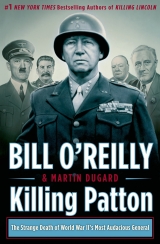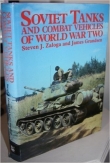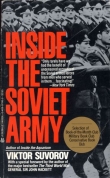
Текст книги "Killing Patton"
Автор книги: Bill O'Reilly
Жанр:
Военная история
сообщить о нарушении
Текущая страница: 18 (всего у книги 25 страниц)
Patton believes that the man to his left, President Truman, has allowed more than twenty thousand American POWs to remain in Russian hands. As a military man, Patton will do whatever it takes to see these men released—even wage war. But he is conflicted, because he understands that Truman’s motivations for allowing these Americans to be held hostage is to ensure that the Russians join in the fight against the Japanese and then, once the war is over, join a new organization to be known as the United Nations, in order to ensure future world peace.8
Patton is becoming more and more certain that the only way he can speak freely about these issues is to leave the military.
Armed with top-secret knowledge and his usual defiant attitude, George Patton has made himself a target—and he knows it.
A few weeks ago, before leaving his daughters in Washington, Patton said something that disturbed them greatly: “Well, I guess this is goodbye. I won’t be seeing you again.”
Patton’s daughters were shocked. “It’s crazy,” they protested. “The war is over.” To which Patton mysteriously responded, “My luck has run out.”
24
IG FARBEN BUILDING
FRANKFURT AM MAIN, GERMANY
SEPTEMBER 28, 1945
4:30 P.M.
The man with eighty-five days to live is about to be fired.
George S. Patton has been summoned, with prejudice, to meet with his boss Dwight Eisenhower. The same foul autumn rains that stymied Patton one year ago in Metz now make flying impossible, so Patton has driven seven and a half hours to the massive industrial office complex that now serves as Ike’s headquarters. Patton spent the journey through the bombed-out ruins of Germany preparing a plan of attack, thinking of the words he must speak to save his career once again. “The ride reminded me of a similar one,” he will write in his diary tonight, that “I took from Knutsford to London … when I was strongly under the impression I was going to be relieved and sent home—if not tried.”
The IG Farben Building rises palatial and scrubbed in the midst of a decimated Frankfurt am Main. Olive-drab American army bulldozers prowl the streets all day long, pushing rubble to the side of roads. The local Germans eke out a living as best they can, collecting debris to make fires for cooking and warmth, sleeping each night in whatever shelter they can find. “Frankfurt resembles a city,” one visitor will write of the destruction, “not so much as a pile of bones and smashed skulls resembles a prized steer.”
But Ike’s headquarters is an island of luxury in this decimation, a beige fortress where the curving stairwells are made of marble, elaborate fountains burble soothingly, and senior American officers can enjoy a meal of venison, ice cream, and red wine—all served by German servants. Visitors need a special pass just to get in the door. When they do, they find the hallways filled with clerks and junior officers who spend their days pushing paper and counting down the hours until they can rotate stateside. The more quick-witted Germans label Eisenhower’s headquarters “G.I. Farben Haus.”
This same grand complex was also the site where the cyanide-based Zyklon B gas, which was used to exterminate millions in the Nazi death camps, was developed. For that reason, the more cynical residents of this city call the structure Das Pharisäer Ghetto, the “Ghetto of the Pharisees.”1
Fresh-cut roses are delivered each day to Capt. Kay Summersby and other women serving in U.S. military offices. Summersby’s secretarial desk sits just outside Eisenhower’s vast office. She wears red lipstick, and her auburn hair is pinned back to reveal her high forehead. Summersby’s brown Women’s Army Corps uniform is tailored to accentuate her figure. Despite the relaxed working environment, she keeps her jacket on at all times, and her tie firmly knotted. Eisenhower’s headquarters is a “luxurious” space, she will write, adding that “several tennis courts could have fitted into Ike’s office.”
Summersby hears the footfalls of George Patton’s trademark riding boots coming down the hallway, and snaps to attention as General Patton enters the office for the long-delayed meeting. Soon she hears Eisenhower raising his voice loud enough to be heard through the thick wooden door. This is not typical behavior for Ike, and Summersby is shocked. The meeting between Patton and Eisenhower borders on the volcanic.
The relationship between Summersby and Eisenhower is far more congenial. They have been together for three years now and are closer than ever. Summersby could have returned to her home in England, but she does not want to leave Eisenhower. However, in just a month, Ike is slated to return to America, where he will replace George C. Marshall as army chief of staff.
Summersby wants to go with him.
She isn’t demanding that Eisenhower leave Mamie, his wife of almost thirty years. She would be content to serve as a member of his staff at the Pentagon. After all this time as part of what Eisenhower calls his “immediate wartime family,” she finds the thought of returning home alone to England devastating.
Their relationship is an open secret. It was quietly condoned during time of war, and even now, Summersby stays in a special house reserved for female officers, which Eisenhower visits most nights for supper and a few rubbers of bridge. Such an esteemed presence at the dinner table can hardly be kept under wraps. But now, unbeknownst to Summersby, great effort is being taken to make sure that the relationship comes to an end.
Army censors have already doctored the official photograph taken at the German surrender ceremony on May 7. The signing took place in a redbrick schoolhouse in Reims, France. In the original photograph, Summersby stands just behind a grinning Eisenhower, who holds up the two pens used to sign the surrender documents. Ike is making a V, for “Victory,” with the pens.

General Eisenhower at the German military surrender
In the censored version of the photograph, Eisenhower is still all smiles, but Kay Summersby’s image has vanished. No other person was edited out of the picture.
The doctored photograph is just the first sign that the affair is doomed. Ike already knows it. Gen. George Marshall has threatened to expose Eisenhower if he requests a divorce.2 Unbeknownst to Summersby, her name will not be on the list of those approved to travel home with Ike. No other member of his staff will be left behind.
* * *
George Patton thinks Eisenhower is “very nasty and showoffish” when Kay Summersby is around. But the shouts that Summersby hears coming from Eisenhower’s office are hardly for her benefit. Patton tries to appear calm, but he squirms in his seat as the evidence against him is presented. He has made a mess of things with the media yet again, going on the record as stating that being a member of the Nazi Party is no different from being a member of the Republican or Democratic Party. “To get things done in Bavaria, after the complete disorganization and disruption of four years of war, we had to compromise with the devil a little. We had no alternative but to turn to the people who knew what to do and how to do it,” he told a small gathering of the press one recent morning in his office, defending his use of former Nazi officials in the rebuilding of Germany.
With war at an end, the journalists who remain in Europe are hungry for any story they can find. Reporters from the New York Times, Chicago Daily News, and New York Herald Tribune were overheard plotting to “get” Patton by tripping him up with loaded questions that would lead him to make the same sort of ill-advised comments to the press that he made at Knutsford.3 The Philadelphia Bulletin saw nothing newsworthy in Patton’s quote, and did not run the story. And the piece was originally buried on the back pages of the Chicago paper. Yet the New York Times, Stars and Stripes, and the New York Herald Tribune made much of Patton’s remarks. Eisenhower was irate when he received word, erupting in what Kay Summersby will later describe as “the granddaddy of all tempers. General Patton had made his last and final mistake.”
Now Patton must explain to Eisenhower how he could have been so careless with his words.
After past missteps, Patton appeared contrite in Eisenhower’s presence. He humbled himself to save his career. But Patton does not do that now. He is dressed in a simple uniform without his pistols. He believes that supplication will be unnecessary. Some well-chosen flattery and reminders of their longtime friendship should be enough to get Patton out of this jam with Ike.
But the truth is Patton no longer has a career worth saving. He is restless and bored. His behavior borders on depressive some days, with the best remedy being a hunting expedition or time on horseback.
Patton desperately misses the war. He longs to arm the Germans and lead them against the Russians. It is a war that should have begun even before Berlin fell, Patton believes. He’s not afraid to stand up to the Russians, as he proved at a September 7 parade in Berlin, to celebrate the end of the war against Japan. More than five thousand American, Russian, French, and British soldiers stood in formation on the bright afternoon, on the broad Unter den Linden Boulevard, near the partially demolished columns of the landmark Brandenburg Gate. Patton stood on the review stand alongside the Russian general Georgy Zhukov, both men squinting in the strong sunlight as the troops marched past in review.
It is Zhukov who put the greatest pressure on Dwight Eisenhower to ensure that Patton hand over all German POWs to the Russians—particularly those elite SS units whom the Russians believe Patton is hiding from them. Eisenhower has already aligned himself with Zhukov, slighting Patton, Montgomery, and every other American and British general by stating in June that “The war in Europe has been won and to no man do the United Nations owe a greater debt than to Marshal Zhukov.”
The Russian general is used to such supplicant behavior. During the war, he ordered his troops to shoot any of their comrades who ran from the Germans, and any Russian village that was thought to have collaborated with the Nazis was burned to the ground. Zhukov is so feared that other Russian generals have been known to tremble in his presence.
Patton does not tremble.
“He was in full dress uniform much like comic opera and covered in medals,” Patton later wrote to Beatrice of Zhukov. “He is short, rather fat and has a prehensile chin like an ape but good blue eyes.”
As Russian tanks rolled past the reviewing stand, Patton noticed Zhukov gloating over the new Soviet IS-3 model tank.4 Looking up at his American counterpart, the Russian general delivered a taunt: “My dear General Patton,” he crowed. “You see that tank? It carries a cannon which can throw a shell seven miles.”

Marshal Georgy K. Zhukov with General Eisenhower
Patton’s face remained impassive, his tone calm and sure. “Indeed? Well, my dear Marshal Zhukov, let me tell you this: if any of my gunners started firing at your people before they had closed to less than seven hundred yards, I’d have them court-martialed for cowardice.”
Patton’s aide Maj. Van S. Merle-Smith will later state that he had never before seen “a Russian commander stunned into silence.”
Yet in his publicly stated belief that the Russians are America’s new enemy, and should be treated as such, Patton stands alone. Indeed, American troops are either going home or being sent to the Pacific to fight the Japanese, leaving fewer and fewer GIs to fight “the Mongols,” as Patton calls the Russians—not that the Truman administration has any intention of doing such a thing.
Among those departing is Sgt. John Mims, Patton’s driver for the last four years. The two have traveled thousands of miles together, and Mims’s caution at the wheel has kept Patton from being injured, despite navigating battlefields and avoiding artillery shells. “You have been the driver of my official car since 1940,” Patton writes in a farewell commendation to Mims. “During that time, you have safely driven me in many parts of the world, under all conditions of dust and snow and ice and mud, of enemy fire and attack by enemy aircraft. At no time during these years of danger and difficulty have you so much as bumped a fender.”
Another driver will soon be assigned to the general, but Mims can never truly be replaced, and Patton is so upset about his leaving that he originally fought to keep him in Europe. Only when he was reminded that Mims has a young wife at home did Patton relent and sign the travel orders.
But even more disturbing to Patton is that all his peers are going home to bigger and better jobs. While Patton spends his days reluctantly getting rid of the Nazi presence in Bavaria, Ike will soon be army chief of staff, Gen. Omar Bradley is already in Washington heading up the new Veterans Administration, and, of course, Gen. Courtney Hodges is off to fight in the Pacific.
It seems there is no place for George Patton in a peacetime army. The one job he really wanted, that of commandant of the War College at the Carlisle Barracks in Pennsylvania, has been given away to Gen. Leonard T. Gerow, a close friend of Eisenhower’s who helped plan and lead the D-day invasion.
As their turbulent meeting stretches on, Dwight Eisenhower finally calms down a bit and gets to the main point: shockingly, his plan is to take away the Third Army from George S. Patton.
With this decision, Eisenhower can effectively terminate the press furor over Patton’s remarks and place someone in charge of the Third Army who will be less sympathetic to the Nazis.
“Your greatest fault,” Eisenhower tells Patton, “is your audacity.”
The words are meant to sting, but both men know that Patton considers audacity his greatest asset.
Then the meeting takes another turn. Instead of simply relieving Patton of active command, Eisenhower suggests instead that Patton assume control of the Fifteenth Army.
It is a face-saving solution, meant to ensure that Patton does not return to America in disgrace. Yet to a fighting man such as Patton, the notion is absurd. The Fifteenth is a paper army, tasked with the job of writing the war’s history.
But Patton has no choice. As he walks out of Eisenhower’s office, he finds the same reporters who published the stories leading to his downfall now waiting in the corridor for news of his fate.
Eisenhower tells them nothing. Patton also says nothing. He would normally have stayed and had dinner and drinks with Ike; instead, Patton rushes to the train station across from the IG Farben Building to catch a 7:00 p.m. train back to Bavaria.
The humiliation slowly sinks in: Patton’s beloved Third Army has been wrenched from his grasp. One of the greatest fighting forces in the history of war will now be commanded by another man. Under Patton’s leadership, that spectacular assemblage of men, tanks, and big guns led the liberation of France, rescued Bastogne, crossed the Rhine, and would have freed all of Eastern Europe if Eisenhower had not halted Patton’s advance.
“I’ve obeyed orders,” Patton tells an aide over dinner on the long nighttime train ride. “I think that I’d like to resign from the Army so that I could go home and say what I have to say.”
But powerful people do not want this to happen. George Patton knows too much—and saying what he knows would be a disaster.
He must be silenced.
25
JOSEPH STALIN’S PRIVATE VILLA
SOCHI, RUSSIA
OCTOBER 17, 1945
AFTERNOON
Joseph Stalin is down but not out.
The sixty-six-year-old Russian dictator is taking a rare vacation at his favorite hideaway. At his direction, the lavish mountain home has been painted forest green, so that it is completely camouflaged within a grove of cypress trees.1 Despite this cloak of invisibility, Stalin is on guard as he strolls alone in the palm-tree-lined courtyard. Trademark pipe clenched firmly between his teeth, he is obsessively contemplating his future—and that of the Soviet Union.
“The Boss,” as Stalin is known, desperately needs time away from Moscow. The fresh air and quiet of this retreat one thousand miles due south of the Russian capital are more than a mere tonic to the overworked despot. Unbeknownst to the Americans and British, Stalin suffered two minor heart attacks at the Potsdam Conference, which he concealed from the public. Despite the ailments, Stalin was able to continue negotiating the future of Europe.
The stress of the war, combined with years of working sixteen hours a day while puffing on a pipe filled with strong tobacco, is taking a savage toll on Stalin’s body. He is afraid that any sign of weakness might lead to an attempt to oust him from power. Only his personal physician, Vladimir Vinogradov, knows the full extent of his health problems. But even at leisure, Stalin is a workaholic and finds vacationing to be a nuisance. Now, as he takes two months away from the Kremlin, spending his days in gardening and long walks, he still receives dozens of reports from Moscow each day.
And these reports trouble him deeply.
Stalin’s absence is causing a furor. TASS, the official Soviet news agency, has simply explained that “Comrade Stalin has departed for vacation to rest,” but few in Moscow or around the world believe there is not more to the story. Foreign diplomats and the international press scurry to learn the truth about what’s happening in Sochi, as rumors fly.2
There are rumors that Stalin will soon quit his job, to be replaced either by Marshal Georgy Zhukov or perhaps by foreign affairs commissar Vyacheslav Molotov. “Stalin may leave his post,” the Chicago Tribune is reporting. “The ambitious aspirations of Marshal Zhukov to become a dictator have full backing of the army, while Molotov is backed by the Communist Party.”
Stalin considers such rumors as a poruganiie—a desecration not only of his reputation but of the power to which he clings so dearly. Two men who learned the hard way how ruthlessly Stalin deals with those who attempt to usurp his power were Marxist revolutionary Leon Trotsky and his son Lev Sedov. Trotsky was once a trusted commissar of foreign affairs, just as Molotov is now. But the bond between Stalin and Trotsky was broken when their ideologies about the true nature of communism began to differ. Eventually, Trotsky was forced to flee Russia, taking up residence in Mexico. There he openly criticized Stalin, believing that he was safe from the long arm of the NKVD.
Trotsky was wrong.
In August 1940, NKVD agent Ramon Mercader attacked Trotsky in his home, plunging the sharp tip of an ice axe deep into the former revolutionary’s skull. Miraculously, Trotsky initially survived the blow, only to die one day later in the hospital.
Trotsky’s assassination mimicked that of his thirty-two-year-old son, Lev Sedov, two years earlier. At the time of his death, Sedov was on the NKVD execution list because he was arranging an international Communist conference in Paris that would celebrate his father’s, rather than Stalin’s, vision of communism.
Sedov suffered an acute attack of what appeared to be appendicitis in late January 1938. His symptoms mysteriously disappeared, then reappeared a few weeks later. Immediately, his best friend, an anthropologist named Mark Zborowski, informed Russian intelligence that Sedov had checked into a small Paris hospital known as the Clinique Mirabeau.
Unbeknownst to Sedov, Zborowski was an NKVD agent.
A few days after emerging from surgery, Sedov was in good spirits. He joked with his wife, Jeanne, and for several days was thought to be enjoying a normal recovery. But when his wife came to visit him on February 14, 1938, Sedov appeared listless.
“You know what they did to me last night?” he asked his wife. Suddenly, Sedov stopped talking, apparently unable to finish his thought. Two days later, to the horror of his wife, he died. An examination found strange purple bruising on his abdomen. Sedov was autopsied twice, but Parisian medical authorities ruled that he’d died from natural causes.3
The NKVD chiefs were relentless in their zeal to develop untraceable poisons. Beginning with Genrikh Yagoda; his successor, the reprehensible Nikolai Yezhov; and then the even more heinous Lavrentiy Beria, the ruthless spymasters pushed Soviet scientists to experiment with deadly toxins.4
The research was done at a top-secret laboratory known as the Kamera (“the Chamber”), where poisons of all kinds were tested on Russian political prisoners. The goal of the scientists working at the Kamera was to concoct an odorless, tasteless poison that would go undiscovered in case of an autopsy.
“We set ourselves the task of developing in the laboratory poisons so that they could be consumed using wine, drinks and food without modifying the taste or color of the food and drink,” one Russian official would testify at Yezhov’s secret trial in 1940.5 “It was also proposed that we invent fast-acting and slow-acting poisons but they had to have no visible impact on the body so that the autopsy on someone who had been poisoned would be unable to detect that the person had been poisoned.”
The Kamera came into being during Stalin’s reign of terror. Various poisons were used to silence enemies of the state. Now, as he endures his necessary time away from Moscow, Stalin has plenty of enemies in need of silencing. He lives like a monk as he plots the future. After spending each day in the gardens, the Boss spends his nights reading hand-carried reports from Moscow. He receives no visitors, and communicates with the outside world only through the occasional telephone call. Among the dossiers he receives each day are reports from Beria apprising him of the findings of the many NKVD surveillance teams hidden throughout occupied Europe. Stalin is already making plans to replace Zhukov as deputy minister of defense, and to humiliate Molotov before firing him as commissar of foreign affairs. As to relationships with the Western Allies, the time away from Moscow is giving Stalin an even greater resolve. “It is obvious that in dealing with such partners as the U.S. and Britain we cannot achieve anything serious if we begin to give in to intimidation or betray uncertainty,” he messages his top advisers in Moscow. “To get anything from this kind of partner, we must arm ourselves with the policy of stoikosti i vyderzhki”—“tenacity and steadfastness.”
The dacha in which Joseph Stalin now rests was built in 1934. Since then, he has personally signed the death warrants of forty thousand people—among them, political rivals, military officials, troublesome intellectuals, and personal enemies. Anyone who dares cross Joseph Stalin soon finds himself dead. All it takes is the stroke of a pen—and perhaps a lethal dose of untraceable poison.
* * *
Two thousand miles northwest of Stalin’s dacha, George S. Patton is restless. Many thoughts run through his mind now that it is no longer occupied by war. Patton understands that he is a famous person throughout the world, and that his future might lie in political activism—he’d rather be “outside the tent pissing in, than inside the tent pissing out,” in his own words. In a way, speaking out about controversial issues would give the general an opportunity to wage rhetorical war. Above all, Patton remains a warrior, but his battlefield may be changing.
And that prospect is not lost on his enemies, one of whom is currently resting in South Russia.
Another is dealing with captured Nazis at Nuremberg.








